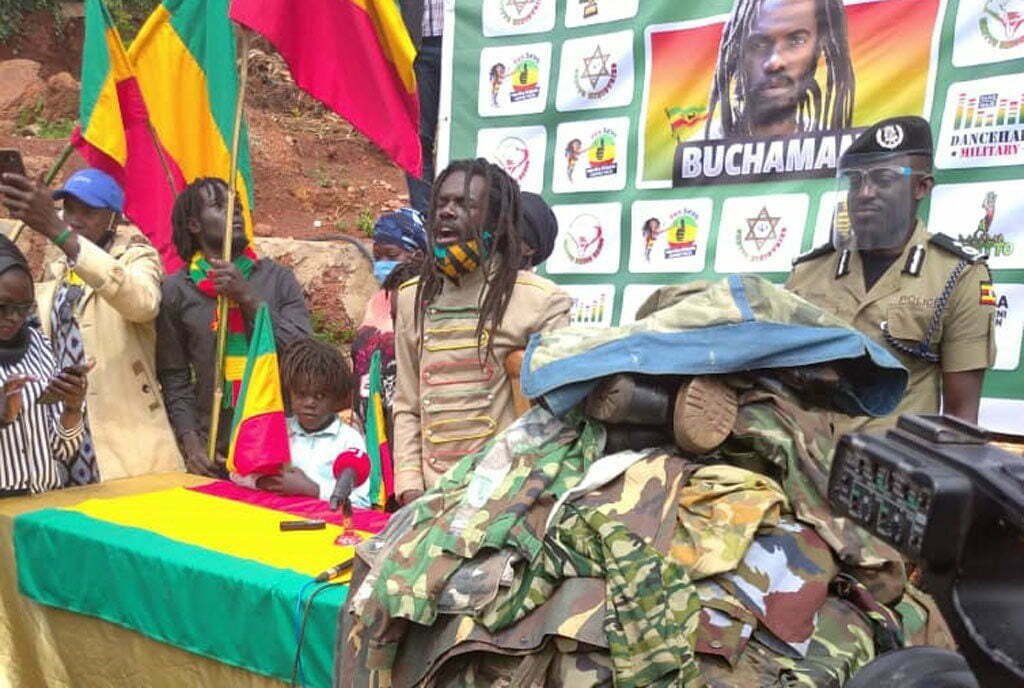
Kampala, Uganda | By Michael Wandati | Amidst a contentious debate regarding the legality and consequences of civilians wearing clothing, insignia resembling security uniforms, the government is considering a ban on importing fabric materials that imitate or replicate such attire.
This potential action follows heightened tensions sparked by recent arrests of individuals wearing such clothing.
The National Unity Platform (NUP) finds itself at the center of this dispute, as many of its supporters have been detained in the ongoing crackdown.
Tailors, vendors, and individuals wearing clothing resembling security uniforms have all faced repercussions from the authorities as efforts to eliminate such attire escalate.
David Lewis Rubongoya, the secretary-general of NUP, has defended the party’s use of red berets and overalls with security combat details, arguing that they are locally made and therefore compliant with the law.
“We see no offense in wearing attire tailored within our borders. It’s a matter of political expression and identity,” Rubongoya said.
However, the government maintains its firm stance on the ban of civilians wearing security-like attire and insignia, expressing worries about potential threats to national security arising from the widespread presence of such clothing.
Dr. Chris Baryomunsi, the government spokesperson, reiterated the Executive’s determination to eliminate any attire resembling security uniforms, regardless of its source.
“Our priority is to safeguard the stability of our nation. Any attire that could potentially be used to disrupt peace and security will not be tolerated,” Baryomunsi said.
In response, the ruling National Resistance Movement (NRM) has taken decisive steps, intending to implement regulations internally to tackle the matter and ensure its members comply with the law.
Tanga Odoi, the chairperson of the NRM Electoral Commission, emphasized the party’s commitment to addressing the controversy prudently.

“We must ensure that our members comply with the law and avoid unnecessary confrontations,” Odoi said.
Also Read: Uganda declares war on imports of used clothing from ‘dead people’
As debates continue regarding the possible prohibition of imported materials resembling security attire, the government has additionally provided guidance concerning the appropriate use of the Ugandan flag on everyday clothing. They advise the public to be cautious to avoid unintentionally becoming involved in the current enforcement efforts.
“We are considering all options, including the possibility of banning certain imported materials,” Baryomunsi disclosed.
“In the meantime, we advise citizens to adhere to regulations regarding the display of national symbols on clothing,” he added.
The Uganda Peoples Defence Forces, via their 4th Infantry Division Public Information Office, issued a warning on May 2, 2024. They cautioned against the wearing of military attire featuring UPDF markings, including warm suits, jackets, ranger boots, berets, caps, porches, and backpacks/camel backs, among others, instructing individuals to stop immediately.
Similarly, on April 22, 2024, the Uganda Police Force, through the National Police Spokesperson, issued a directive. They addressed Private Security Organizations, Bouncers Associations, Political groups, and individuals using Police uniforms and rank insignia (PIPS), declaring it illegal and demanding an immediate halt.

Earlier, on September 1, 2023, the Uganda Peoples Defence Forces UUPDF), through their Defence Spokesperson, expressed concern over civilians wearing military insignia, such as berets, lanyards, and clothing. They urged individuals to surrender such items to security authorities and discontinue their use.
Furthermore, the Uganda Police Force, through its Public Relations Officers and Community Liaison Officers, has engaged in television and radio talk shows. They have encouraged individuals possessing items reserved for security forces to surrender them to local authorities or the nearest police station.

As a result, security agencies have commenced an intelligence-driven operation following court orders. They have cordoned off offices, residences, shops, and other locations where such items might be found.
The objectives of this operation include cordoning off areas, conducting searches in targeted premises, collecting all items reserved for security forces, prosecuting suspects found with such items, and restoring order.
The public is urged to surrender these items to local authorities, the police, District/Division Internal Security Organisation (DISO), or the nearest UPDF unit.
Amidst the ongoing debate, both political parties are at odds regarding the interpretation of laws concerning attire, laying the groundwork for potential legal and political disputes in the days ahead.



